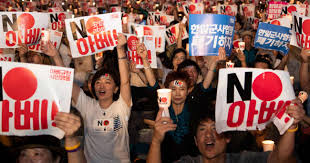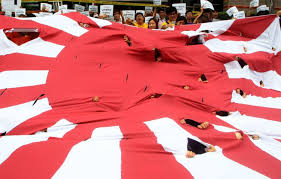Anti-Japanese sentiment is gaining momentum in South Korea again. It seemed that Japan-South Korea relations had thawed out quickly since the inauguration of the Yoon Seong-ryol administration, but it seems that this was only an appearance.
The reason for the recent upsurge in anti-Japanese sentiment is the unpopularity of President Yoon. Since the ruling People’s Party suffered a major defeat in the parliamentary elections held in April this year, the president’s approval rating has continued to slump, hovering around 30%. The latest data released by the Korean research company Realmeter shows a rating of 29.6%, the second worst since the start of the administration.
Amidst this, the opposition parties continue to increase the volume of their criticism of the Yoon administration. In particular, recently, there have been a succession of voices from the main opposition party, the Democratic Party of Korea, denouncing the policies of the Yoon administration and the ruling party as being “pro-Japanese”.
‘Pro-Japanese criticism’ in South Korea has been repeated in the past, and is not at all unusual. Generally speaking, ‘pro-Japanese’ in South Korean society refers to those who cooperated with Japan during the period when Japan ruled the country before the war. In particular, it has never been used in any other context, especially among politicians.
The same was true of the “pro-Japanese settlement” policy advocated by former President Moon Jae-in, who took a hard-line stance towards Japan during his time in office. And across South Korea, there was a campaign to find records of people who had cooperated with Japan during the period of Japanese colonial rule, and to have them remembered as great figures in Korean history.
For example, in 2018 there was a campaign to criticize Kim Seong-su, the founder of the Dong-a Ilbo newspaper and Korea University, as a pro-Japanese person. Of course, he had passed away, but the situation made headlines as students demanded that his statue be removed. In other words, being labeled as “pro-Japanese” is tantamount to being treated as a “sinner”.
However, recently, anti-Japanese sentiment has been gaining momentum to the extent that people are being labeled as “pro-Japanese” simply for making comments or taking actions that seem to be in line with the current Japanese government’s view of history.
Let me give you an example. The director of the Ministry of Employment and Labor is due to be replaced soon under the Yoon administration. Prior to this, a personnel hearing was held on August 26 to determine whether or not the candidate for the new director, Kim Mun-soo, was suitable for the position. However, the hearing was held up for 13 hours because of comments made by Kim at the hearing, which were pointed out as being pro-Japanese.
The statement in question was that the nationality of Koreans during the period of Japanese rule was “Japanese”. In response, a member of the Democratic Party of Korea who had asked the question asked again, “Is the nationality of our ancestors Japanese?”, to which Kim replied, “Isn’t their nationality Japanese? Don’t you know that?”.
This time, the opposition members criticized Mr. Kim for “denying” the Republic of Korea and its constitution.
The background to this debate is the difference in perception of the founding of the Republic of Korea.
JBPress Toshiharu Hirai










